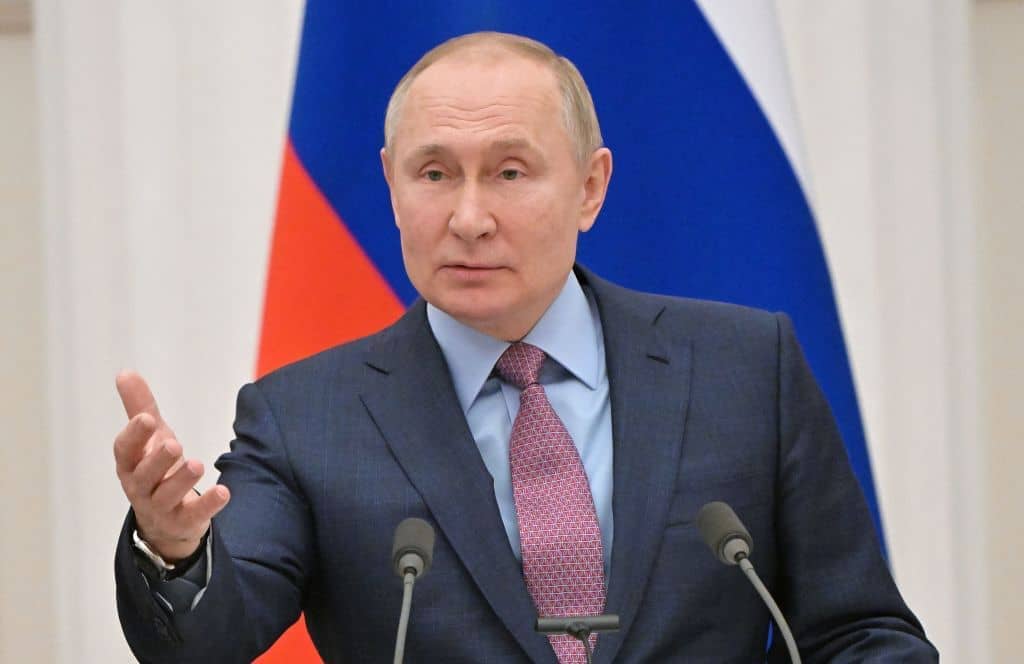As the Soviet Union fell to pieces around our ears, we in the Moscow embassy used to discuss the Weimar precedent. A great nation, humiliated by a lost war and economic misery, tries but fails to set up a democracy. It then falls victim to a dictator who promises to restore his country’s greatness and bring justice to the millions of fellow countrymen who have been trapped in foreign countries which only exist as a result of maps drawn by the victors.
British, French, and American diplomats may have been incompetent and pusillanimous before 1939. But one man, and one man only, was responsible for the outbreak of war: Adolf Hitler when he invaded Poland. Putin is no Hitler, and Russians resent any comparison. But there’s no doubt at all that Putin’s provocative behaviour is responsible for the current mess.
Putin used to be able to judge exactly what he could get away with. In Georgia in 2008 and in Crimea in 2015, he stopped before he lost control. Now he has demanded that the Americans roll back Nato in terms which he must know would never pass in Washington. Perhaps he has been in office so long that his political instincts are deserting him. That is dangerous.
Perhaps Putin has been in office so long that his political instincts are deserting him
Putin himself justifies his action on two grounds. The Russians, he says, were double-crossed when western leaders assured them in the early 1990s that NATO would not expand to the East once it had absorbed a united Germany. And offering membership to Ukraine was a provocative step too far. Since Ukraine isn’t a real country anyway, he argues, what are we all talking about?
Western diplomacy towards Russia since 1991 was indeed arrogant and incompetent, partly in the belief that Russia could now be counted out of the game. Britain, France, Germany and America did at first agree amongst themselves that the East Europeans should neither be brought into Nato nor given security guarantees. Western leaders spoke accordingly. All that is fully documented. But they gave no written guarantee that Nato would not enlarge, nor is it in the least likely that they would formally have tied their hands for the future.
And then they changed their minds. We all felt guilty for our successive betrayals of Czechs, Poles, Balts, East Germans, and Hungarians. The East Europeans were always convinced that Russia would not remain long on its back: they were bound to seek protection where it could best be found. Who can now say they were wrong?
Many Russians would agree with Putin’s one-sided version of Ukraine’s complicated history, including his idea that Ukraine has no real right to exist. But many countries in today’s Europe have existed only since the end of the first and second world wars. Ukraine has as much claim to existence as anyone else. If you challenge that, you have no way forward but chaos.
The Americans and their allies have shown no sign that they have the will to defend Ukraine on the battlefield. By offering Ukraine membership of Nato that was largely meaningless, they were setting up yet another East European country for betrayal. But now, even if they will not put fighting men on the ground, they have to find every way of supporting Ukraine if they are not simply to roll over at Putin’s behest. That includes giving the Ukrainians weapons to defend themselves, and imposing serious sanctions on Russia, even though these cannot act quickly and will pain us too.
The Americans have offered to talk to the Russians about the arms control arrangements which have been dismantled in recent decades. Putin has demanded that for years, but it is in everyone’s interest. It is a welcome return to the Cold War practice of talking seriously to the Russians in private even when the public relationship is poisonous, because both sides know that the alternative could be nuclear catastrophe.
One possible outcome could be an understanding that Ukraine would not enter Nato for the foreseeable future, but was entirely free to develop economic links with everyone, including the EU. In exchange the Russians would undertake to leave the Ukrainians alone. The Finns hacked out a similar arrangement for themselves after 1945. It helped that the Russians knew from experience that they would fight if pushed too far. Even Finns now look back on ‘Finlandisation’ with distaste. It was better than the likely alternative of becoming a ‘People’s Democracy’ under Soviet dominion.
Whether the Americans could achieve that, and bring the Ukrainians with them, is of course entirely unclear. Once a war starts no one – not even Putin – knows where they will find themselves when the guns fall silent.






Comments